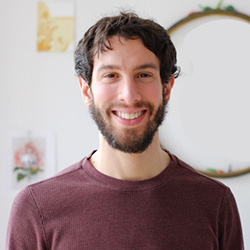Three New Affiliate Faculty Members Join Northwestern CS
Northwestern Computer Science continues to strengthen and expand research collaborations across the University, welcoming its three newest affiliated faculty members, Joshua Glaser, Duri Long, and Malcolm MacIver, to advance the department’s multidisciplinary academic mission.
“I am delighted to welcome Joshua, Duri, and Malcolm to Computer Science — courtesy faculty bring a wealth of experience and collaborate with our students on exciting new projects and, in fact, some of them are already working with CS graduate students,” said Samir Khuller, Peter and Adrienne Barris Chair of Computer Science at Northwestern Engineering. “Joshua and Duri are new faculty at Northwestern, and Malcolm is well known to all our robotics faculty. They strengthen our research community interested in computing and how computing is impacting the world.”
Joshua Glaser

His lab's research focuses on developing more interpretable machine learning tools to analyze neural activity data.
“Computationally, we are excited about developing more interpretable machine learning methods, rather than having methods that work as black boxes,” Glaser said. “Scientifically, we are excited to study how the brain can flexibly control wide-ranging movements and behaviors, and how the interaction between different brain regions and cell types changes across behaviors, internal states, and diseases.”
Glaser earned a bachelor’s degree in mathematics and physics from the University of Illinois Urbana-Champaign and a PhD in neuroscience at Northwestern University advised by Konrad Kording. He completed postdoctoral research at Columbia University's Center for Theoretical Neuroscience.
“I’m very excited about collaborating with other faculty, working with exceptionally bright students, and creating bridges between the computer science and neuroscience communities at Northwestern,” Glaser said.
Duri Long

She investigates issues centered around AI literacy and human-AI interaction, including how insights into human interaction and learning can inform the design of public AI literacy interventions as well as the development of AI that can interact naturally and improvise creatively with people in complex social environments.
Long has worked with artists and museums around the country to develop co-creative, embodied exhibits, and art installations involving AI and technology. Long and Georgia Tech collaborators Brian Magerko and Jessica Roberts are co-PIs on a National Science Foundation (NSF) Advances in Informal Science Learning grant titled “Fostering AI Literacy through Embodiment and Creativity across Informal Learning Spaces.” The team is developing exhibits with the Museum of Science and Industry in Chicago to engage middle-school children in AI concepts such as bias in machine learning data and AI decision-making processes through creative making activities.
Long earned bachelor’s degrees in computer science and dramatic art from the University of North Carolina at Chapel Hill and a PhD in human-centered computing from Georgia Tech.
Malcolm MacIver

A member of Northwestern Engineering’s Center for Robotics and Biosystems, MacIver is interested in understanding how animals acquire sensory information and use that to guide movement and decision-making. His work focuses on extracting principles underlying animal behavior, focusing on interactions between biomechanics, neuronal processing, evolution, and sensory system properties. MacIver incorporates these principles into advanced biorobotic systems, or large-scale simulations on computing clusters.
In 2009, MacIver received a Presidential Early Career Award for Science and an NSF Faculty Early Career Development Program (CAREER) award.
MacIver earned a PhD in neuroscience from the University of Illinois Urbana-Champaign, and the Beckman Institute of Advanced Science and Technology. He completed a master’s degree in philosophy and earned bachelor’s degrees in philosophy and computer science from the University of Toronto.
